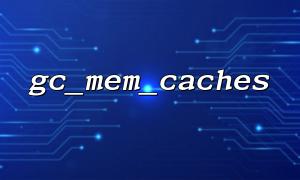In PHP's garbage collection mechanism, gc_mem_caches and gc_collect_cycles are two essential functions. Properly combining their use can significantly enhance memory reclamation efficiency, reduce the risk of memory leaks, and optimize program performance. This article will explain in detail the functions of these two methods, their usage, and how to combine them for the best memory management practices.
In PHP, garbage collection (GC) is responsible for automatically reclaiming variables and objects that are no longer referenced, preventing memory leaks. PHP tracks variables through a reference counting mechanism, but for circular references (when two or more objects reference each other), simple reference counting cannot reclaim the memory. This is where garbage collection comes into play.
gc_collect_cycles() is a function provided by PHP to actively trigger garbage collection. It scans and reclaims memory used by circular references.
Performs a full garbage collection cycle, attempting to reclaim all memory used by circular references.
Returns the number of cycles that were reclaimed.
<?php
// Create a circular reference example
class A {
public $b;
}
class B {
public $a;
}
<p>$a = new A();<br>
$b = new B();<br>
$a->b = $b;<br>
$b->a = $a;</p>
<p>// Actively trigger garbage collection<br>
$collected = gc_collect_cycles();<br>
echo "Reclaimed $collected circular reference cycles\n";<br>
?><br>
gc_mem_caches() is a function used to clear the internal caches of the garbage collector, releasing memory. These caches are typically temporary data structures created during the garbage collection process.
Clears the internal garbage collector caches, releasing extra memory.
Does not actively reclaim circular references, only releases cached data.
<?php
// Clean up GC caches to release memory
gc_mem_caches();
echo "Garbage collection caches cleared\n";
?>
In a PHP script, simply calling gc_collect_cycles() will reclaim memory used by circular references, but the garbage collection caches will still exist, occupying additional memory. At this point, if you immediately call gc_mem_caches(), you can release those caches and further reduce memory usage.
<?php
// Trigger garbage collection
$collected = gc_collect_cycles();
echo "Reclaimed $collected circular references\n";
<p>// Clean up GC caches to release extra memory<br>
gc_mem_caches();<br>
echo "Garbage collection caches cleared\n";<br>
?><br>
For example, PHP scripts that run for long periods (such as daemon processes, CLI scripts, or task queue workers) tend to use more memory and are prone to circular references. It is recommended to periodically call these two functions to manage memory effectively.
Example:
<?php
while (true) {
// Simulate business logic
do_something();
$collected = gc_collect_cycles();
gc_mem_caches();
echo "Reclaimed $collected circular references, caches cleared\n";
// Sleep to prevent excessive CPU usage
sleep(10);
}
?>
gc_collect_cycles() is used to reclaim memory from circular references.
gc_mem_caches() is used to clear the garbage collector's internal caches.
Using both together can more effectively free memory, reducing memory leaks and bloat.
In long-running scripts, calling these two functions appropriately helps maintain stable memory usage.
Mastering and correctly using these two functions can significantly improve memory reclamation efficiency in PHP programs, ensuring application performance and stability.
For more details about PHP's garbage collection mechanism, you can visit:
https://gitbox.net/manual/en/function.gc-collect-cycles.php
https://gitbox.net/manual/en/function.gc-mem-caches.php


